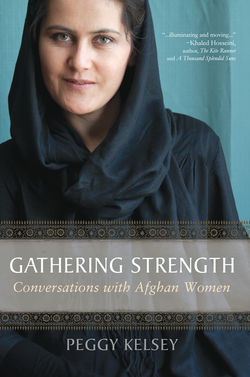Читать книгу Gathering Strength: - Peggy Kelsey - Страница 20
На сайте Литреса книга снята с продажи.
ОглавлениеElaha
Singer
The biggest consequence of being on television was that now some people loved me and some people hated me. Before, no one knew me so I didn’t have this experience.
My translator and I arrived at Elaha’s small, gray house in mid-afternoon. She led us through her sparse courtyard; up a dark, cramped staircase; into a vibrant peacock-blue room with orange trim. Red and gold toshaks and matching pillows lined the walls in lieu of couches and chairs. We pulled back the heavy curtains to have enough light for photography. Elaha reminded me of a little bird, nervous, self-conscious, and fragile.
Despite being a refugee from Afghanistan, Elaha grew up a leader among her Iranian classmates. At about age 12, she fell in love with painting and created some modern works in oil and graphite. When her family returned to Kunduz, a provincial capital in northern Afghanistan, she worked as a journalist on a radio program about women.
Later her family moved to Kabul, where she studied music at a private school for five years. She studied many kinds of music but chose to perform pop/rock because she can best express her feelings through that musical style. Her break came when she appeared on the television show Afghan Star, a program like American Idol. She sang occasionally on Ayna, an Afghan TV channel, gave a performance at The Women’s Garden2 on International Women’s Day, and also a concert in Mazar-e Sharif for Now Ruz, the Afghan New Year.3
Because of her appearances on TV and the resulting family conflict, she, her sister, and her brother moved out of their parents’ house to live on their own, where I met her in 2010. A year later, she went to India for further study.
Peggy: What is it like for you to be onstage, singing a song that you love to a huge audience listening with rapt attention? What is that like?
Elaha: Most of my songs are sad. When I try to sing a happy song, somehow it seems to contain tragedy or sadness. When I’m onstage, I try to express my feelings very strongly. Some people make fun of that; some people like it. Some just listen to the tune and others to the poetry. There are also people who resonate with the feelings in the song and the way I sing it. The most important thing is that I can express myself and share my experience. But my interpretation of the songs is related to the audience; every listener finds him or herself in my song. So it’s not just about me. The audience is also part of my singing and they interpret my songs however they like. I take something from the culture and transfer it to the audience. Their interpretation of my art is not related to me personally, but it has a very clear relationship with their own personal and historical experience.
Peggy: Do you write your own songs?
Elaha: No, but I love the poetry of Forugh Farrokhzad4 and Siavash Kasrai and I often sing their poems.
